As Trump purges prosecutors, ethics officials and watchdogs, courts check his authoritarian overreach
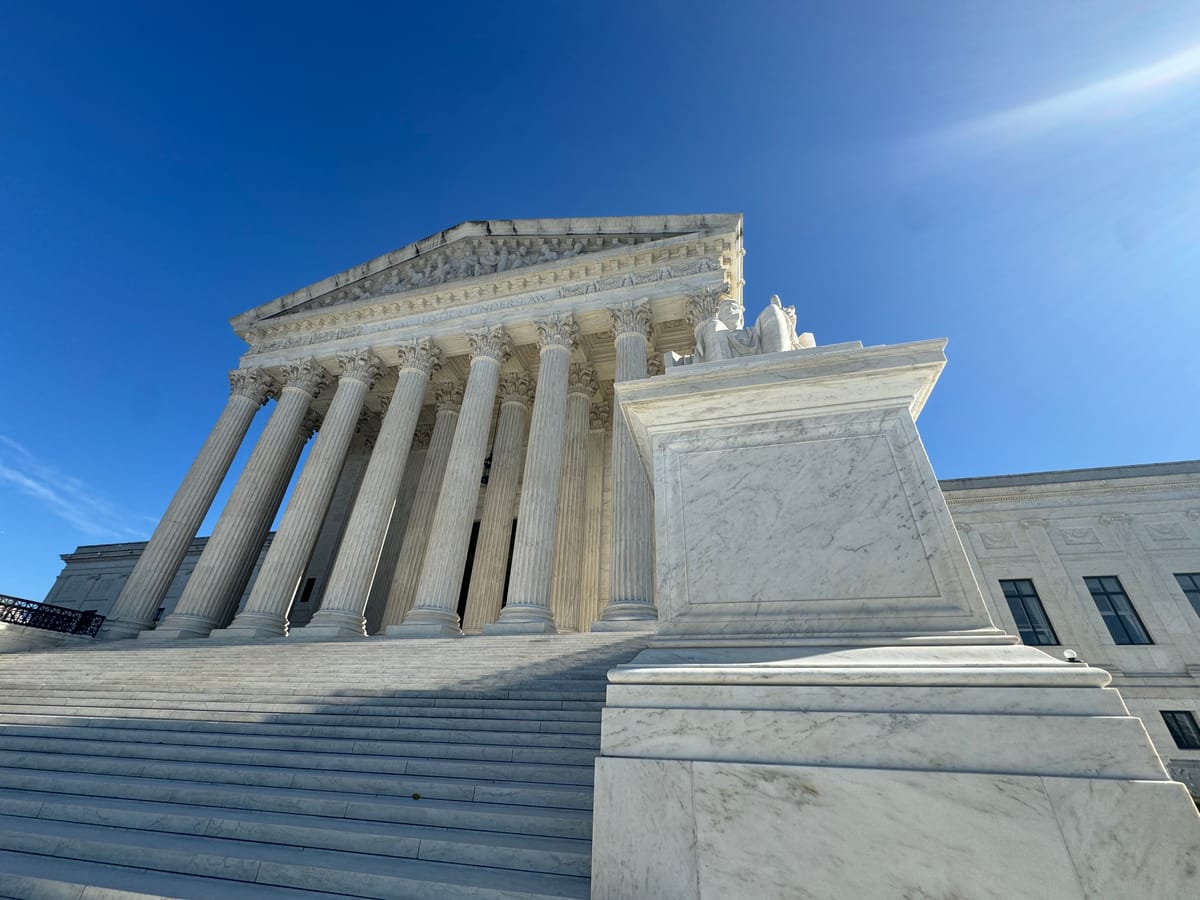
Good evening from wintery Washington, where the steady snowfall doesn’t obscure a wave of firings across the United States government that is raising the probability of historic corruption unchecked by lobotomized institutions and defanged watchdogs.
The first three weeks of the Trump administration have been characterized by pattern and practice of dismissing officials whose mission it is to combat waste, fraud, and corruption.
From inspectors general to a top ethics officials to a special counsel to the chair of the Federal Election Commission, all have been fired without stated cause, rationalization, or communications to Congress.
It’s all been quite dark, which why I’ve been writing about “blatantly unconstitutional behavior,” an authoritarian transition, and the constitutional crisis provoked by an imperial presidency usurping the powers of Congress.
On Monday, a federal judge in Rhode Island said the Trump administration has defied a court order.
The ruling was the first time a judge expressly declared that this White House was disobeying a judicial mandate.
On Monday, he fired the director of the Office of Government Ethics, whose confirmation long-time readers may recall me celebrating as a bulwark against corruption last year.
Trump also directed the Justice Department to stop enforcing the Foreign Corrupt Practices Act, which bans companies based in the USA from bribing foreign government officials.
That’s right: he told the independent federal enforcement agency charged with upholding our laws not to enforce one of those laws — specifically, an anti-corruption statute Trump has hated for a long time.
The same day, the Justice Department dropped public corruption charges against New York Mayor Eric Adams.
As Devlin Barrett reports, these acts “stunned current and former prosecutors and investigators who said the department was abandoning a tradition of holding public officials, corporate executives and others accountable for corruption in favor of an approach built on political or economic expedience.”
…to some current and former Justice Department officials, the steps reflect the degree to which Mr. Trump — as a politician who has faced multiple indictments, and a real estate magnate who prioritizes deal-making — is deeply antagonistic to law enforcement efforts to clean up politics and corporations.
The actions “send a message that going forward, you can get good contracts by paying bribes,” said a former F.B.I. agent, Debra LaPrevotte. She added: “Having fought corruption for 28 years of my life, I don’t think the efforts to fight kleptocracy and corruption have gone too far. We want to live in a world where rules apply.”
As with dismissing the head of a government ethics agency or inspectors generals without cause, a President who seeks to abuse his powers to stop prosecutors from an enforcing anti-corruption law that bans the executives of businesses based in the United States from bribing foreign government officials, it’s fair to conclude what they are for — and it is not good governance.
As a long suffering good governance advocate guy told Newsweek back in 2017, this is inherently a political problem. It’s about a president with a transactional approach to politics in which legalized bribery is literally the cost of doing business, right down to the patronage system that the United States had moved away from in the 21st century.
Once again, Congress is not holding him accountable as he commits brazen abuses of power. Instead of holding hearings about the interming commercial interests of Trump — or of Elon Musk, Members of Congress express concerns in private, unwilling to risk the loss of poltical power or influence that would come with dissent.
President Trump himself is not being transparent, again.
To recap, Trump's record on open government in office:
🚫No tax returns
🚫No White House visitor logs
🚫Obstructed special counsel & Congress
🚫Retaliated vs. whistleblowers
🚫Fired inspectors general
🚫Undermined press freedom
🚫Censored data
He’s picked up right where he left off, but this time has targeted the ethics officials who are entrusted with ensuing appointees disclose their assets, divest from conflicts of interest, or protect whistleblowers who file complaints about fraud, waste, and abuse — like the one who informed Congress of Trump’s attempt to extort Ukraine‘s President with appropriated military aid, which led to his first impeachment for corruption.
Last Friday night, President Trump didn’t just fire the Archivist of the United States: He also sought to dismiss the head of the Office of Special Counsel (OSC), an independent agency that enforces whistleblowing laws and the Hatch Act and investigative claims of discriminatory practices against veterans.
And that’s where the act of our American history was just stopped bending towards authoritarianism.
Hampton Dellinger, the special counsel who was confirmed by the Senate to lead OSC, filed a lawsuit seeking a temporary restraining order — and a judge has granted it.
As with other notices that the White House has sent to other officials the President has sought to purge, there was no cause cited for Dellinger’s dismissal. But unlike many other appointments, that’s clearly against the law.
When Congress created the independent agency in 1978 it mandated that “the Special Counsel may be removed by the President only for inefficiency, neglect of duty, or malfeasance in office.”
Trump failed to do so, so for now, as ace legal affairs reporter Josh Gerstein reports, Dellinger is back in the office after a court order.
In sum, three weeks in, Trump has caused a Constitutional crisis by seeking to impound funds, freeze appropriate aid, close independent agencies, and issue a blizzard of executive orders.
While Republican-controlled Congress is continuing to sit supine, ceding its authorities and powers to a petty tyrant that Washington warned Americans of centuries ago, the administration keeps losing in court.
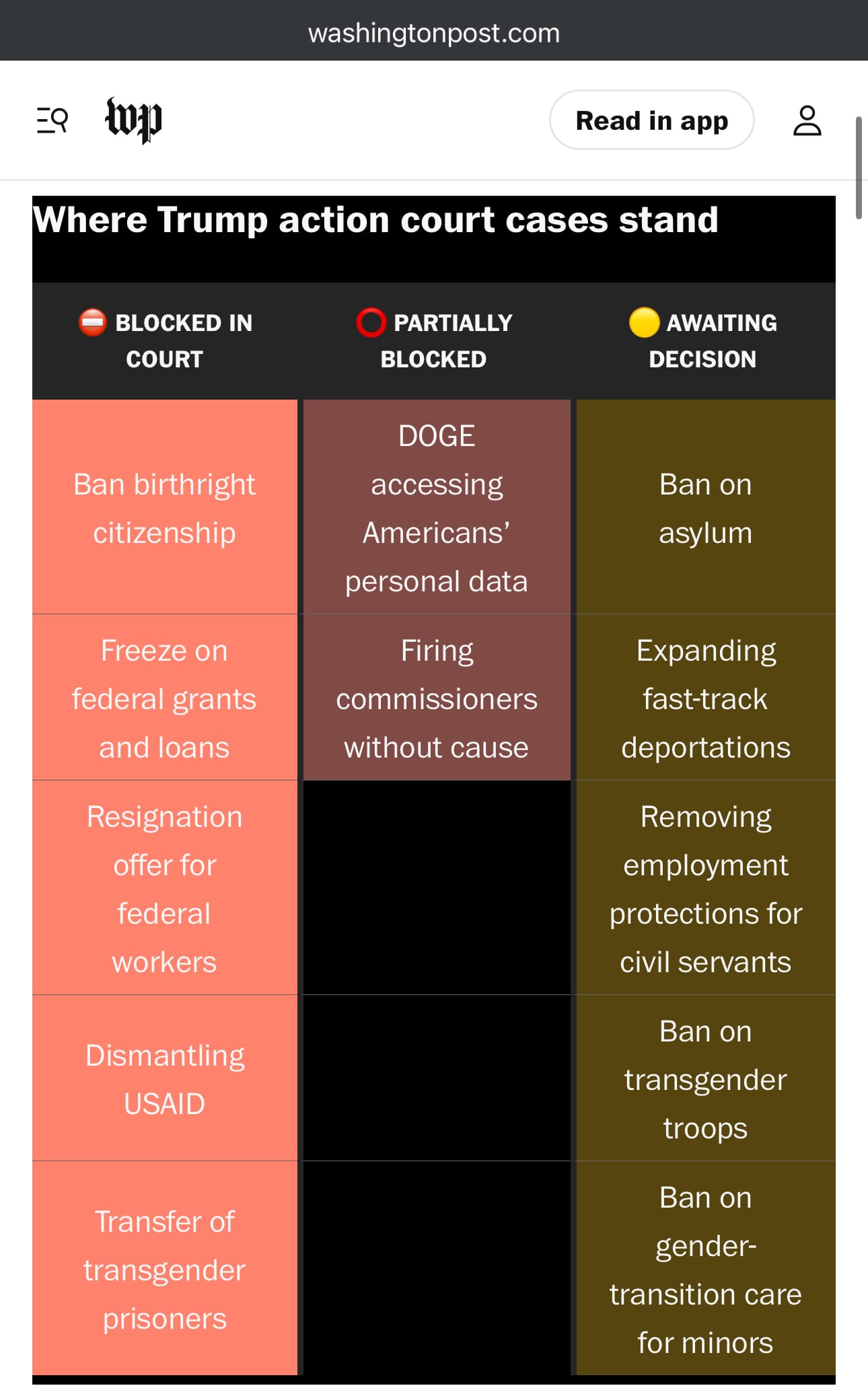
In fact, as the Washington Post’s new case tracker shows (gift link), the Trump administraction is not winning, at all.
But all of that losing is setting up a much more dire existential conflict between an authoritarian party intent on imposing policy goals through executive fiat that could not be accomplished by legislation and the independent judiciary that is the remaining institutional bulwark upholding the rule of law in the United States.
As independent legal journalist Chris Geidner reports, Vice President J.D. Vance, tech oligarch Elon Musk, and Senators are all decrying “rogue judges” who need to be fired …because they’re faithfully carrying out their constitutional roles as a separate, co-equal branch of government.
As Geidner highlights,
The illegal and unconstitutional actions need to be challenged in court, and they are being challenged. Congress needs to assert itself soon as well, before its powers atrophy. Everyone, at every level of government must use their powers to stop Trump and Musk’s illegal and unconstitutional overreach. And the public must be engaged — informing themselves about the steps Trump and Musk are taking in their name and then pushing back.
The ultimate question here, though, is what happens if and when a court says no to Trump or Musk and they say the court’s order is illegitimate.
Yes, if it gets to that point, it gets very bad.
If we see this, it’s ballgame for the rule of law in the United States of America.
But don’t lose heart just yet, much less participate in the anticipatory obedience we’ve seen in too many business leader adopted, nor the silence that still characterizes tens of millions of shell-shocked Americans who didn’t vote for serial violations of the rule of law — or the nearly 90 million Americans who didn’t vote at all.
Every American benefits when “equal justice under law” is a reality, not a broken promise engraved on the Supreme Court.
When the laws that Congress passes are upheld by the officials who swear an oath to protecr and defend our Constitution, we are a nation where no human is above the law, nor any citizen below it. Injustice to any one of us is a threat to the civil rights and civil liberties of all.

The State of the Net
In between getting my daughter to school and picking her up early as the winter storm descended this afternoon, I walked over the 2025 State of the Net conference, which I’ve been attending since I came to DC as a dewy-eyed tech policy reporter in 2009.
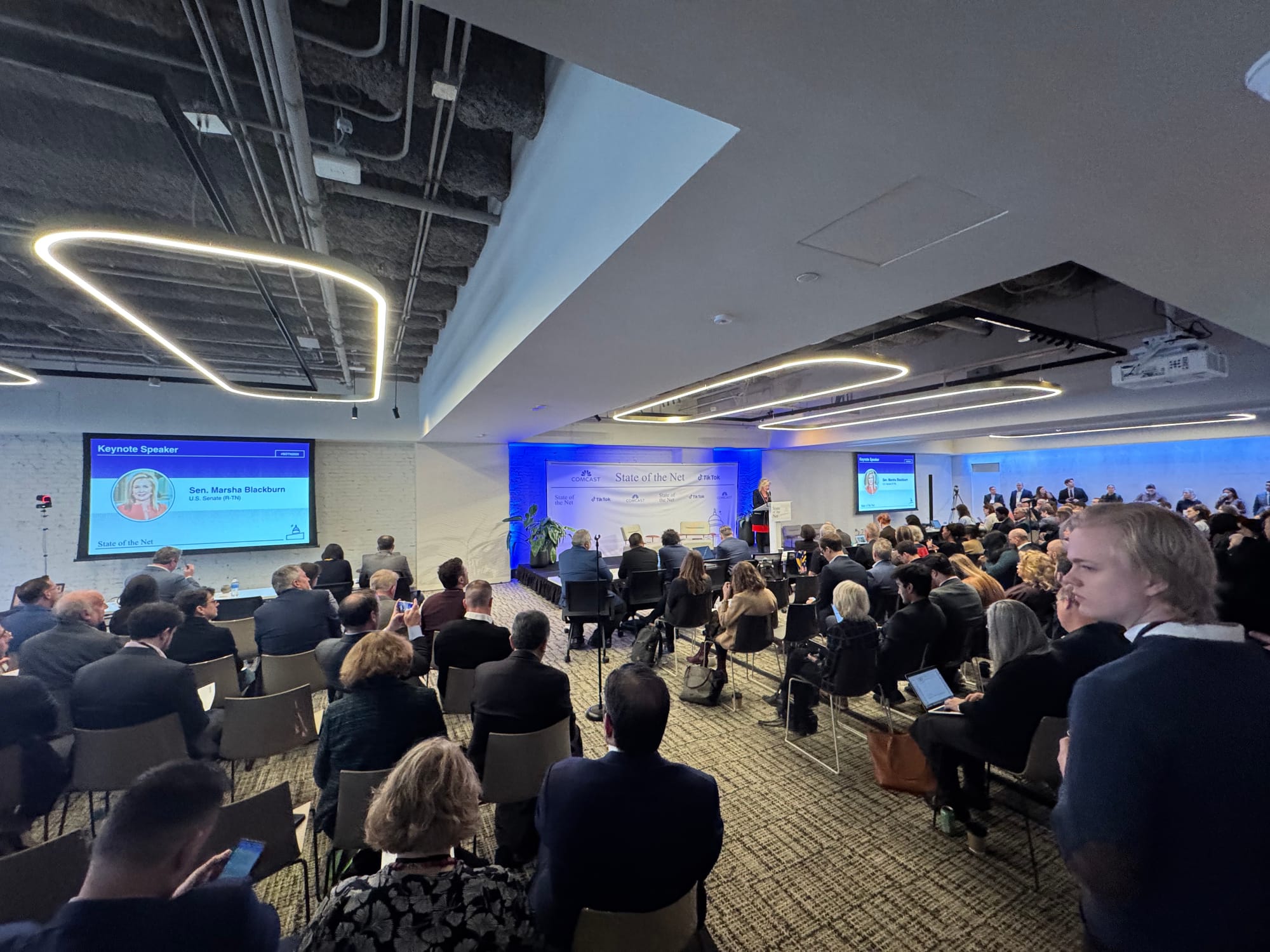
It felt like “Groundhog Day” for data protection as I heard a Senator calls for an online privacy law.
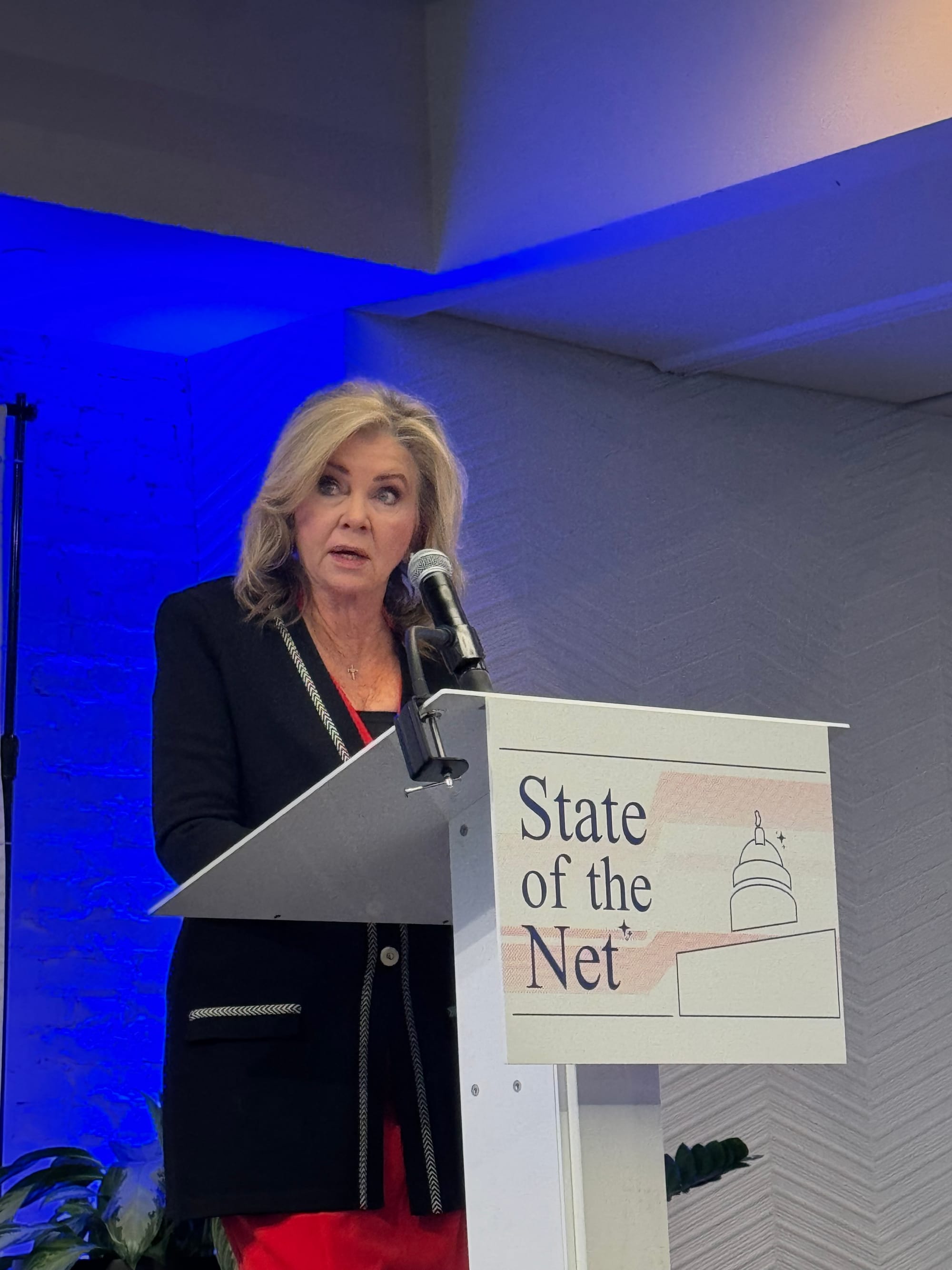
“Time for a national preemptive privacy standard,” declared Senator Marsha Blackburn. As I have seen over the last two decades, that goal is much easier said than done.
Unfortunately, Congress and former President Biden decided forcing Bytedance to divest from TikTok would be a better guard against Chinese manipulation of public opinion or theoretical, undisclosed national security threats than enacting a data protection law that would codify privacy as a human right in the United States.
I went to the conference seeking signals for what’s coming to technology policy in Washington, or is already here. I found ghosts of the machine past, the preoccupations of our future present, and glimpses of the future in panels on AI, quantum computing, broadband access, data protection, deepfakes, and what Trump would mean for Internet policy or the world order.
Standard fare for one of the best wonkfests in the country, which is why I go back and keep trying to ask good questions.

Sadly, the cold brew coffee was off, but the rest of the food, programming, and folks gathering was excellent.
What’s immediately notable to me was who’s missing: no keynotes on tech from White House officials, from the new U.S. chief information officer to the nominee to lead OSTP, much less a as-yet-to-be nominated USCTO.
It’s pretty clear at this point that Special Government Employee Elon Musk is the most powerful, influential U.S. Chief Technology Officer in U.S. history, but he has not been appointed and confirmed to that position, with the hearings, background checks, and ethics agreement that comes with it.
In the meantime, technology policy has been upended by the new administration, which is why the world saw our tech oligarchs lined up behind the new President on Inauguration Day.
While deregulation and a shift from a safety and risk-based approach to AI towards permissionless-innovation is ongoing, as expected, I saw a panel on deepfakes that showed how much movement there is towards enacting new tools to respond to the challenges that exist now, not in the years to come.
Any images or video can now be faked with increasing realism, said Jeremy Strong, a managing director at Venable who leads the Better Identity Coalition. I’ve known him for over a decade, going back to when was the founding leader of the National Program Office for the National Strategy for Trusted Identities in Cyberspace during the Obama Administration — what I once called a Manhattan project for online identity.
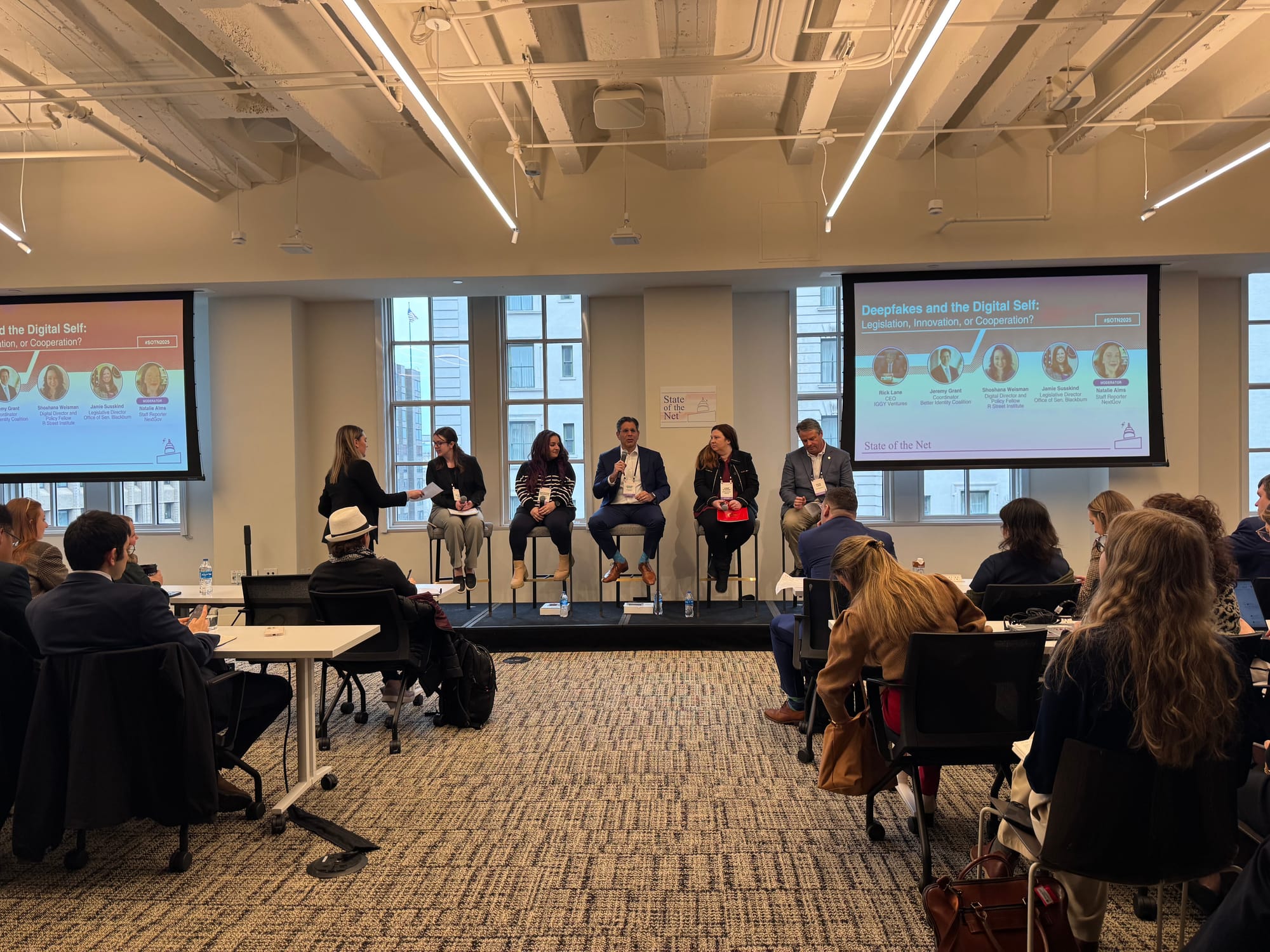
What’s new is not just the weaponization of synthetic media to commit fraud, suggested Strong, but doing so at scale to compromise organizations. On the Internet of today, it’s harder to authenticate you’re you, or a dog.
I asked the panel what the prospects were in the House for a bill to criminalize distributing nonconsensual intimate images, sfter it was stripped from the NDAA (unclear) and if the U.S. government should be forcing people to use ID.me to use IRS.gov, invest in Login.gov, or do something else.
In the audio below, you should be able to hear my questions and the answers of Grant, Jamie Susskind, legislative director for Senator Blackburn, and Shoshana Weissman, digital director and policy fellow at the R Street Institute.
In defense of vaccines
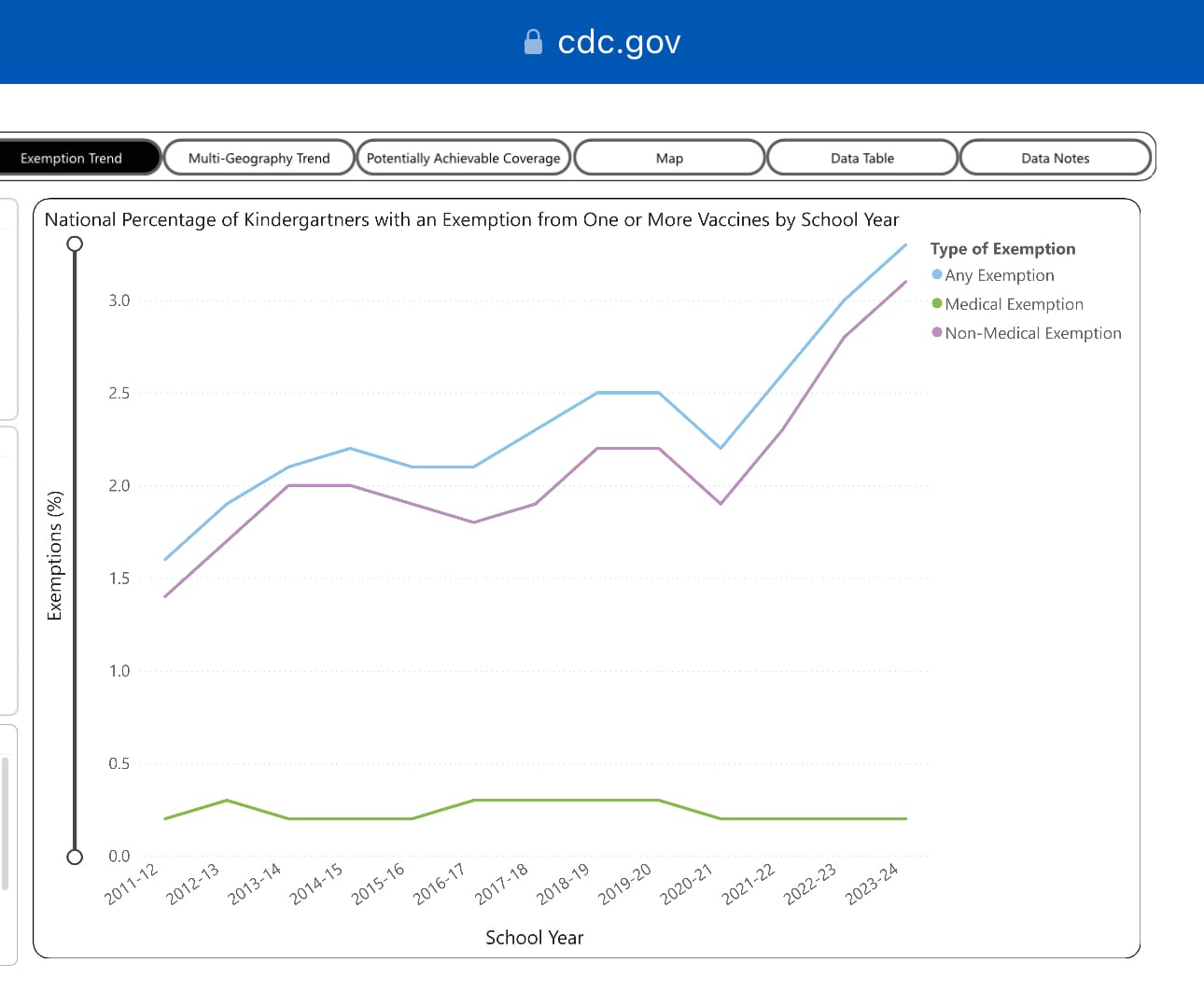
There is a measles outbreak in Texas, in a county where 18% of incoming kindergartners in the 2023-24 school year did not get the measles, mumps, & rubella vaccines. Like COVID-19, measles is an infectious airborne disease, albeit one with a much higher replication rate, which can leave people with long-term health effects.
Exemption rates for vaccines are rising in counties where there is hostility borne out of the pandemic closely correlated with partisanship. Kids will get terribly sick who didn’t need to be. A few of them may die.
Parents will learn terrible lessons after believing lies.
We have been blessed to live in an age of medical miracles delivered by science. Vaccines, germ theory, & antibiotics doubled the human lifespan over the last century.
That progress is now under dire threat from antibiotic resistance, misinformation, & corruption. It’s mourning in America.
Scientific breakthroughs led to extraordinary public health outcomes, but public benefits also derived from activists, public intellectuals, & political leaders who enacted reforms & encouraged lifestyle changes.
Washing our hands, no smoking indoors, vaccinations, sewage plants, wearing condoms, helmets, PFDs, masks, and so on.
While our elected leaders and members of the American public are free to ignore medical guidance and to seek to enact laws or rules that will negatively affect public health, public safety, and national security, the rest of us don’t have to agree.
Speaking of which, a number of friends have had bad cases of flu this season. Stay safe out there: wash your hands, get your shots via vaccines.gov, and push fluids and seek Tamiflu if you catch it. Keep calm, and carry on.
Finallly, it’s good to see more new subscribers since yesterday! If you continue find what I send valuable, insightful, or useful, please share these pieces with your social networks and consider becoming a paid member, if you're not already – or tell me what I need to do to earn your support at alex@governing.digital.



